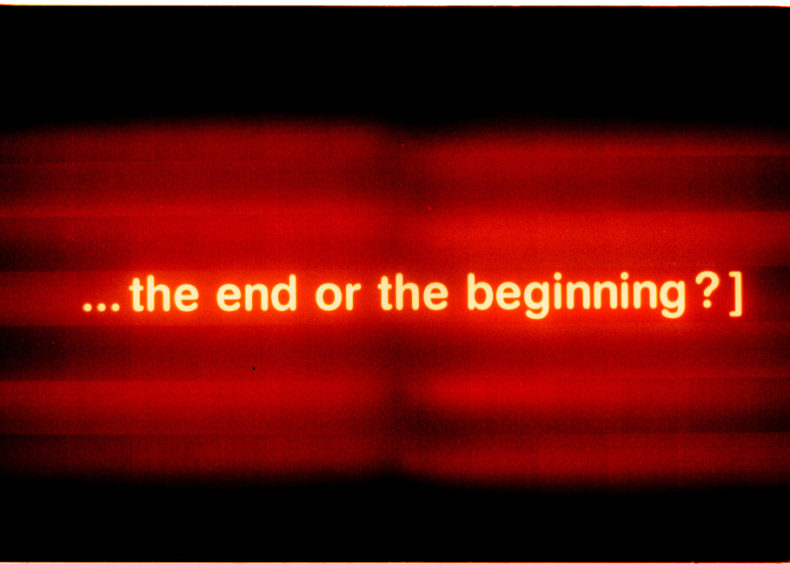
Some of the best shows on television should have ended before they did. Dexter, Weeds, some even think The Office dragged its feet out the door a few seasons too many. There are shows that are still going that really should be put out of their misery already (looking at you, Family Guy).
It’s hard to end something. It’s hard to figure out when to stop. Is it when the show stops making you enough money to be worth it? Is it when you stop being creatively fulfilled? Is it when enough other things come along that you really hate saying no to that you realize that maybe you should stop doing one thing so you can start doing another?
I think about how things end a lot. In part because I make a show that has no pre-set end point. I host and produce a podcast called Flash Forward. It’s a show about the future. Every week is a new future. Like many radio shows and podcasts, Flash Forward doesn’t follow a singular narrative plot. I could produce episodes of Flash Forward until I die. Which means that ending the show will be a choice. Assuming I don’t die first. Knock on wood for me people.
It might be a choice based on creative ambitions. Last year, after 47 episodes, Megan Tan decided to end her podcast Millennial. It was time, she decided, to pursue other projects. The show took up all her time, and demanded a lot of access to her personal life. Mike Rugnetta decided to end his incredibly successful YouTube series “Idea Channel” last year as well. Mike made several videos explaining why this was happening, and much of it boiled down to the fact that Mike wanted to do some other stuff.
It might be a choice based on another opportunity. Andrea Silenzi put her show Why Oh Why on hold when she was offered a gig hosting the podcast Longest Shortest Time. If someone wants to pay me to write books or make TV or a movie, hey, I’ve got lots of ideas. (You can reach me at rose@roseveleth.com).
It might be a choice based on finances. That’s looking more and more like the most probable option, but also the saddest. Flash Forward used to basically pay for itself. But advertising has dried up recently, metrics have changed, grant funding seems impossible to attain, and today, the show isn’t exactly sustainable. I won’t get into the details, because they’re boring and embarrassing, but suffice to say that the show won’t last on its current income streams.
This isn’t a post about Flash Forward ending. It’s not ending. At least not for now. But I think a lot about how to decide when to hang up the mic for the show, and what I might say when I do.
If you google “how to start a podcast” there are a bazillion results. But searching for how to end one garners very little. People celebrate the beginnings of things, but nobody tells you how to stop the train. Books and movies and even TV shows can end gracefully, their story lines wrapping up, people riding off into the distance. Podcasts like mine, have to explain why they’re ending, make a point of it, leave people with little closure, no nice narrative bow at the end.
I could say nothing. There’s actually a term for podcasts that just… stop posting. It’s “podfading,” which is a terrible word but hey, I didn’t make it up. Here’s a delightful story from 2006 in WIRED (yes there were podcasts before Serial), that uses it. The story begins with a podcast covering the show Lost, which ended abruptly and left fans reeling. The two hosts were not professional podcasters, they were a married couple with three kids, one of whom was about to start night classes. They simply didn’t have time to keep the podcast going. That same WIRED story interviews another podcaster who called it quits because the money wasn’t there. “There was no money in it and it did nothing to push my career forward. I’ve got a lot of other things in my life, paying work being one and my family is another. It’s not like blogging, where you can do it for 15 minutes at a time and get away with it,” he said.
I could explain the situation, whatever it might be, some combination of financial frailty and creative differences. But that’s boring and makes me sound like a loser who couldn’t hack it.
I could borrow from Frankenstein, by Mary Shelley, a book whose ending I love: “He was soon borne away by the waves, and lost in darkness and distance.”
Or perhaps I should quote E.T., at the end of the movie named after him, and simply say “I’ll Be Right Here.” But I won’t, because the show would be ending.
There is some irony that I’m not sure how to end this post, about not knowing how to end a show. So for help, I googled “ending generator” to see if some kind soul had supplied one. I couldn’t find one, but I did find a “first-line generator,” which seems close enough to a last-line generator to work for our purposes here. So perhaps when I end Flash Forward I’ll simply tell people that “The day my wife acquired magical powers, we ran over the cat.”
Image: noodle12, Flickr
Is part of this that an ending to something we like feels like a death? Think about favorite books. For me, the best ones are the ones that leave me wishing they hadn’t ended, that I could spend more time with the characters. And when they’re gone, it leaves me a little sad. Almost mourning for my friends who are gone.
Ecclesiastes 3:1-8